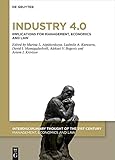Industry 4.0 : Implications for Management, Economics and Law / ed. by Marina L. Al'pidovskaya, Artem Krivtsov, Aleksei V. Bogoviz, Ludmila A. Karaseva, David I. Mamagulashvili.
Material type: TextSeries: Interdisciplinary Thought of the 21st Century : Management, Economics and Law ; 4Publisher: Berlin ; Boston : De Gruyter, [2021]Copyright date: ©2021Description: 1 online resource (XI, 149 p.)Content type:
TextSeries: Interdisciplinary Thought of the 21st Century : Management, Economics and Law ; 4Publisher: Berlin ; Boston : De Gruyter, [2021]Copyright date: ©2021Description: 1 online resource (XI, 149 p.)Content type: - 9783110650655
- 9783110650747
- 9783110654486
- online - DeGruyter
- Issued also in print.
| Item type | Current library | Call number | URL | Status | Notes | Barcode | |
|---|---|---|---|---|---|---|---|
 eBook
eBook
|
Biblioteca "Angelicum" Pont. Univ. S.Tommaso d'Aquino Nuvola online | online - DeGruyter (Browse shelf(Opens below)) | Online access | Not for loan (Accesso limitato) | Accesso per gli utenti autorizzati / Access for authorized users | (dgr)9783110654486 |
Frontmatter -- Introduction: Challenges for Management, Economics and Law during a Transition to Industry 4.0 -- Contents -- Part I: Innovations and Economic Growth in Industry 4.0 -- 1 Challenges in Identifying Fast-Growing Companies to Differentiate Government Support Measures -- 2 Economy without Finance: Situation in R&D -- 3 Innovative Activity in Post-Pandemic Conditions -- 4 The Challenges of Digitalization for Economic Relations of Tourism Industry Subjects -- Part II: Finances, Corporate Accounting and Management in Industry 4.0 -- 5 Russian Foreign Loans Market: Problems of Balancing -- 6 The Problem of Monitoring the Effectiveness of Projects in the Process of their Implementation -- 7 The Use of Digital Technologies in the Implementation of Internal Control in the Management Accounting System -- 8 Tactical and Technical Solutions for Intraoperative Critical Situations -- Part III: Sustainable Development in Industry 4.0 -- 9 Digital Modernization in Enterprises of Agricultural and Water Management Industry -- 10 Role and Value of Production Accounting in Providing the Company’s Microeconomic Stability -- 11 Sharing Economy: How Digital Technologies Have Changed Economic Reality -- 12 The Impact of the Fourth Industrial Revolution on the Socio-Economic Development of the World Economy -- Part IV: High Technologies and State Management in Industry 4.0 -- 13 Economics of Industry 4.0 in the Political Economy Paradigm -- 14 Features of the Company’s Organizational Culture -- 15 Harmonizing the Interests of the State and Business in Stakeholder Management -- 16 Methodological Approaches to Tender Procedures in Corporate Procurement Management in Companies -- Conclusion: Future Perspectives of Industry 4.0 -- List of Figures -- List of Tables -- Index
restricted access online access with authorization star
http://purl.org/coar/access_right/c_16ec
Industry 4.0 is not only just a new sector of economy—it is a new technological model of economic development, which will determine the technical possibilities, organizational philosophies, and approaches to managing socio-economic systems in the near future. Signs of the Fourth Industrial Revolution can already be seen in the most progressive developed and developing countries. However, despite the high interest of entrepreneurs in the possibilities that are provided by Industry 4.0, large-scale investment projects and the adoption of state and national strategies and programs to facilitate the financing and transition to Industry 4.0, the Fourth Industrial Revolution is developing very slowly. The reason for this is the non-systemic character of the implemented initiatives.
Issued also in print.
Mode of access: Internet via World Wide Web.
In English.
Description based on online resource; title from PDF title page (publisher's Web site, viewed 28. Feb 2023)


